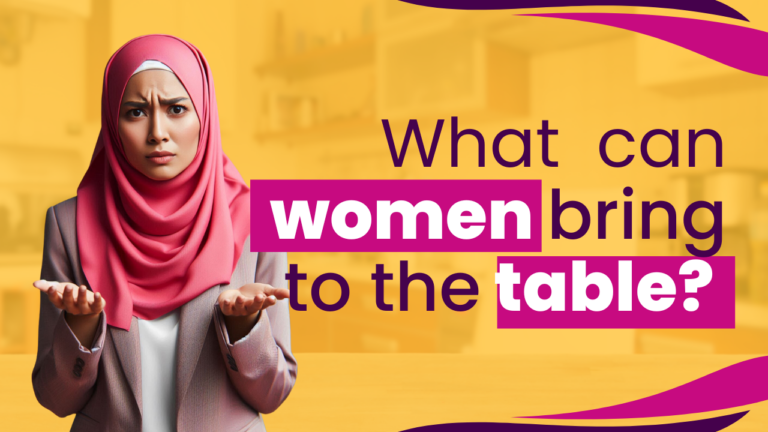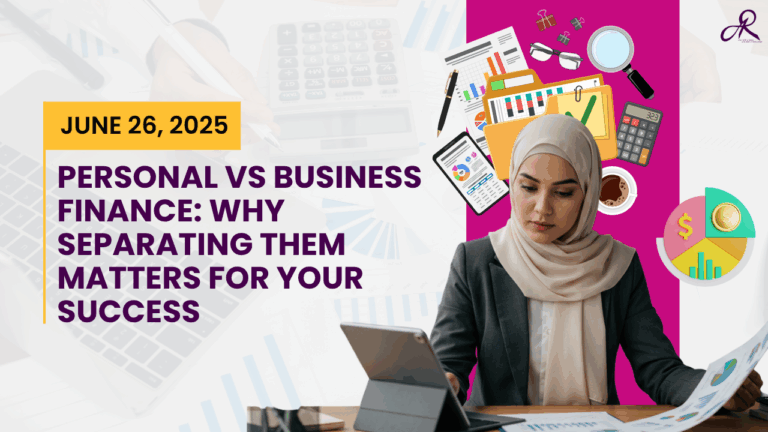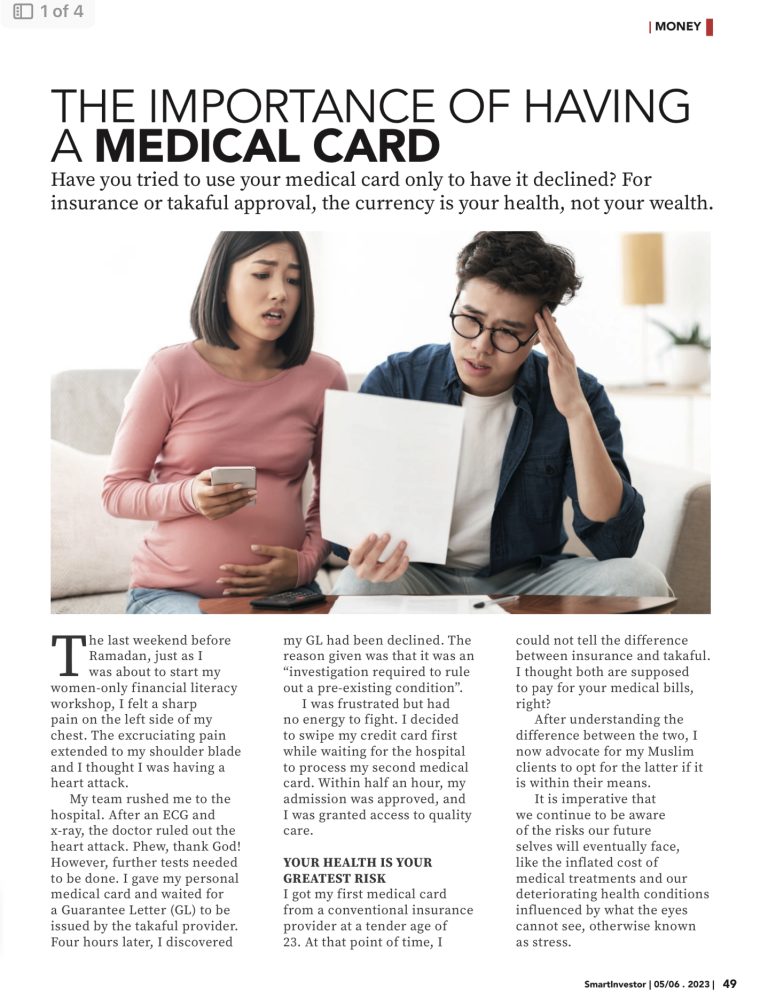How do I talk to my partner about finances before getting married?—and what are some of the most important topics to raise?
Money is not a safe conversation. Do you talk about it with your parents, siblings or friends? Is it something you chat freely about over lunch?
We rarely talk about our income or our debt situation. As you climb higher professionally, you have an image to keep up and it gets harder and harder to talk about debt, for example. But what happens when women feel safe to speak freely? They start opening up. And one of the things they open up about is finance.
Talking about financial planning openly is still very much a taboo in Asia. There is a misconception that men are the only ones who are supposed to be financially literate. Even as a married woman, why rely on your husband for financial matters? In Malaysia, women typically outlive men by several years, which means we’ll be alone for a portion of our retirement. Aside from that, three things could happen: the death or disability of your partner could approach earlier than expected, or they could leave you for someone else.
These circumstances will push you to be financially literate by force. What if you’re a stay-at-home mum who has never known about what goes on financially in your own house? I had a student who was a stay-at-home mum for 25 years, and when her spouse passed away suddenly, she was caught unaware. How do you become someone who earns an income 25 years after being a stay-at-home mum? It’s a huge adjustment, because it’s not by choice.
Courtship conversations
It is good to come clean about your finances if you’re at that stage of dating or courting when you feel the relationship is going to get more serious. Of course, it’s not always easy to come clean. Emotion tells you you’re so in love with this person, and you trust that everything they say is the truth.
I learned from my own experience of bankruptcy with my husband. My husband and I knew each other for just six months before we decided to get married in 2013. When we got married I had no idea that he was facing bankruptcy. I never asked, especially because I got pregnant immediately.
The biggest reason he didn’t want to come clean with me about it was because he was concerned that it would affect my pregnancy. Of course he’s no longer bankrupt today. We’ve been married 11 years and have been together for 12. Naturally, it was hard to talk about finance at the beginning of our marriage and the courting stage. For years after getting married, we avoided the money conversation because money was scarce and we were in bankruptcy. I hated him, he hated me, and we were constantly competing with one another. It was hard.
What broke the cycle for us is when a friend recommended we see a life coach. In those sessions, my husband and I started coming clean about our triggers about money, and we started coming back into alignment, especially about finance. I learned that when two individuals come together in marriage, they bring their own beliefs, pain and trauma with them. Without addressing all that baggage, it’s hard to expect a happy marriage. Once we did address those things, we stopped competing with one another.
How should we talk about money?
How do I talk to my partner about finances before getting married?
Listening to logic instead of emotion will tell us to come clean early on in the relationship, especially if you’re seriously considering marriage. One of the easiest ways to do this during the dating or courtship stage is to gift each other with your credit report. In Malaysia this is known as a CTOS report, essentially a financial report card by the Malaysian Credit Reporting Agency (CRA) that indicates what debts or financial problems you have, or whether you are going through bankruptcy. If I could turn back time, I would have done this. How many couples are upfront about this? Sure, it can be awkward. Ego may prompt your partner to play the victim card or guilt-trip you with statements like ‘Why do you need to know my credit score? Are you all about money?’ But is it not a red flag in itself if they do not want to show you their report? If you end up supporting someone, a potential spouse, who is not open about their finances, that itself should be a red flag. If they are not open before marriage, they are unlikely to be open after.
Secondly, it’s a good idea to sit down and talk about who will pay for what after marriage. Because we often assume that when you enter a marriage, the man will look after everything, which is not necessarily true.
Thirdly, talk about having separate accounts. This is an unpopular opinion, but having joint accounts can potentially be very messy later on in the case of death or divorce. Even buying assets together and having a joint property can be tricky. There are two parts when it comes to owning property—the ownership and the loan or financing. It is much easier to have just one name on the ownership of the property even if you have both signed a loan to support the financing of the property. If possible, the ownership should be in your name. I have mentored women who have had to let go of joint assets because they are filing for a divorce. It is a very difficult and painful experience to go through. The most important thing is to have these conversations early and as a woman, to consider the worst case scenario.
In a relationship, it is important to discuss three types of goals: short, medium and long-term. Without financial literacy or awareness, I see a lot of couples today who don’t realise that they are competing with one another, and that’s where all hell breaks loose.
Let’s not disregard the fact that there are people in life who use money as a way to control and abuse their partners. There are plenty of narcissistic men and women out there who use money as a tool to love-bomb their partners. One thing I always tell housewives is to plan for their retirement independently. We’ve met women who tell us they do not have a plan because their husband is a big-time CEO and they have a joint retirement plan. How sure are you that he will live to the age of 60? The best thing to do is to plan for your own retirement separately, and learn how to invest on your own.
I know it sounds cliched, but honestly, the best investment is investing in yourself. When a woman grows, the entire community around her grows. What happens when you start leading the change in your family, or when you start seeking financial education? When you champion financial literacy in your own space, you start talking about it to your kids, your siblings, your parents. If you start investing in yourself and taking baby steps to become financially literate, you’ll see the benefits of it ten years or more down the road.
If you come from a lineage where you don’t talk about money, you’ll be the one spearheading the change for the benefit of future generations. We have to be cycle breakers. The taboo ends today, with you.
Aisya Rahman is a licensed Islamic financial planner and the CEO and founder of Aisya Rahman Advisory, a training centre in Malaysia that promotes women’s financial literacy through its flagship workshop, Women & Wealth, and other programmes
This story is part of Front & Female’s series She Speaks, through which we aim to drive open, inclusive and unfiltered conversations tackling the sensitive topics that impact women.


Originally published on tatlerasia.com
Credits to Tania Jayatilaka







